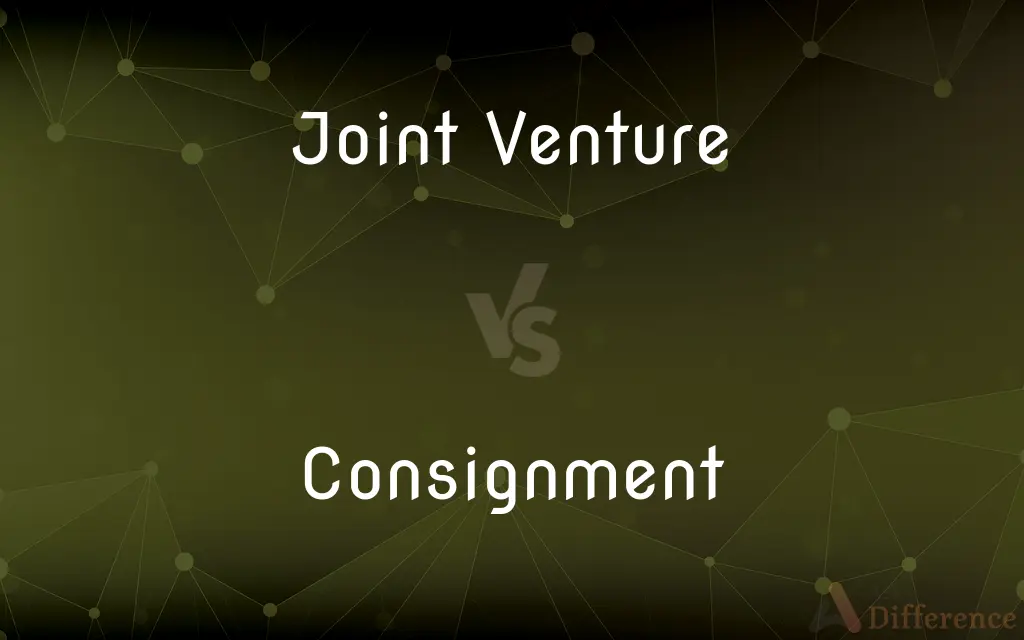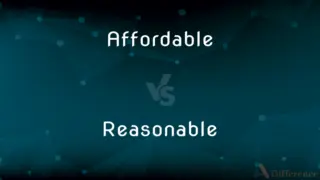Joint Venture vs. Consignment — What's the Difference?
Edited by Tayyaba Rehman — By Fiza Rafique — Published on November 29, 2023
A Joint Venture is a business arrangement between entities to achieve a specific goal. Consignment is an arrangement where goods are left with a third party to sell, but ownership remains with the consignor.

Difference Between Joint Venture and Consignment
Table of Contents
ADVERTISEMENT
Key Differences
A Joint Venture (JV) refers to a business arrangement where two or more parties come together to pursue a specific project or business activity, pooling their resources and expertise. This collaboration usually has a set duration and is directed towards achieving a particular objective. Consignment, on the other hand, involves giving goods to another party, often a retailer, to sell on behalf of the owner (consignor), but the ownership of the goods doesn't transfer until they're sold.
Both Joint Venture and Consignment are collaborative in nature, but they serve different purposes. While a Joint Venture focuses on combining strengths and resources of different businesses for mutual benefit, Consignment is more about allowing a third party to handle the sales process of a product, with the risk of unsold inventory remaining with the consignor.
In a Joint Venture, all parties involved share in the profits, losses, and control of the venture, depending on the terms of the agreement. They pool resources, like capital, technology, or expertise, for mutual benefit. In contrast, in a Consignment agreement, the consignee sells the goods on behalf of the consignor, and upon a successful sale, remits the proceeds minus a commission or fee.
To sum it up, while both Joint Venture and Consignment involve partnerships, they differ significantly in their objectives, risks, and rewards. A Joint Venture is a collaborative business effort for shared goals, whereas Consignment is an arrangement to facilitate sales without transferring ownership until a sale occurs.
Comparison Chart
Purpose
Business collaboration for a specific project or objective
To sell goods on behalf of another, without transferring ownership
ADVERTISEMENT
Ownership
Shared ownership based on JV agreement
Ownership remains with the consignor until sale
Risk
Shared risk depending on agreement
Risk of unsold goods remains with the consignor
Profit/Loss
Divided among participants based on agreement
Consignee takes a commission, rest goes to consignor
Duration
Often time-bound for the project's duration
Continues until
Compare with Definitions
Joint Venture
A partnership aiming for mutual benefit in a business activity.
The Joint Venture between the airline companies expanded their global routes significantly.
Consignment
An arrangement to sell goods for a party, with ownership retained by the consignor until sale.
The artist placed her paintings on Consignment at the downtown gallery.
Joint Venture
A business alliance where parties retain their distinct identities.
Though they operate in a Joint Venture, both brands maintain their unique marketing strategies.
Consignment
A sales agreement where risk remains with the goods' owner.
The bookstore accepts indie authors' books on Consignment, ensuring a diverse collection.
Joint Venture
An arrangement where entities pool resources and expertise.
Two leading car manufacturers entered a Joint Venture to produce electric vehicles.
Consignment
Providing goods to another to sell, taking a commission upon sale.
The designer boutique operates mainly on Consignment, showcasing various independent designers.
Joint Venture
A collaborative business effort between parties for a specific project.
TechCorp and GreenEnergy formed a Joint Venture to develop new solar technologies.
Consignment
An arrangement where unsold goods can be returned to the consignor.
The craftsman provided his handmade pots on Consignment, allowing unsold items to be taken back.
Joint Venture
A shared enterprise with specific goals and duration.
The construction firms formed a Joint Venture to build the city's new stadium.
Consignment
The act of consigning.
Consignment
Something consigned.
Consignment
A collection of goods to be sent, in transit or having been sent.
Consignment
The act of consigning.
Consignment
The sale of one's own goods (clothing, furniture, etc.) through a third-party vendor, in exchange for a portion of the sale price, and with the consigner retaining ownership of the goods until they are sold or abandoned.
Consignment
The act of consigning; consignation.
Consignment
The act of consigning or sending property to an agent or correspondent in another place, as for care, sale, etc.
Consignment
That which is consigned; the goods or commodities sent or addressed to a consignee at one time or by one conveyance.
To increase your consignments of this valuable branch of national commerce.
Consignment
The writing by which anything is consigned.
Consignment
Goods carried by a large vehicle
Consignment
The official act of consigning a person to confinement (as in a prison or mental hospital)
Consignment
The delivery of goods for sale or disposal
Consignment
A method of selling where the seller only gets paid when the item is sold.
Many thrift stores operate on Consignment, benefiting both the store and the original owners.
Common Curiosities
How does the consignee earn in a Consignment agreement?
The consignee earns by taking a commission or fee from the sale of consigned goods.
Is a Joint Venture the same as a merger?
No, in a Joint Venture, parties retain their distinct identities, while in a merger, entities combine to form a single entity.
What's the primary objective of a Joint Venture?
The primary objective of a Joint Venture is collaborative business efforts between parties to achieve specific mutual benefits or projects.
Is Consignment limited to physical products?
While typically associated with physical products, Consignment can also apply to digital goods or services in some scenarios.
Do consignees buy the goods they sell?
No, in Consignment, consignees do not buy the goods. They sell on behalf of the consignor.
Why might companies choose a Joint Venture over going solo?
Companies might choose a Joint Venture to pool resources, access new markets, share risks, or combine expertise for mutual benefit.
Who retains the ownership of goods in a Consignment agreement?
In a Consignment agreement, ownership remains with the consignor until the goods are sold.
Can a Joint Venture be formed between more than two companies?
Yes, a Joint Venture can involve multiple parties or companies collaborating for a shared objective.
Are there risks associated with Consignment for the consignor?
Yes, if the goods do not sell, the consignor bears the risk of the unsold inventory and might not recoup costs.
How long does a Joint Venture last?
The duration of a Joint Venture varies and is typically defined by the terms of the agreement or until project completion.
Can any business form a Joint Venture?
Yes, any business can form a Joint Venture as long as parties agree on terms and have a shared objective.
What happens to unsold goods in Consignment?
Unsold goods in Consignment typically remain the property of the consignor and can be returned if not sold.
How are profits and losses managed in a Joint Venture?
In a Joint Venture, profits and losses are typically divided among the participants based on the terms of the agreement.
Can Consignment agreements be terminated?
Yes, Consignment agreements can be terminated based on the terms set by both parties.
Share Your Discovery

Previous Comparison
Niagara Falls vs. Victoria Falls
Next Comparison
Affordable vs. ReasonableAuthor Spotlight
Written by
Fiza RafiqueFiza Rafique is a skilled content writer at AskDifference.com, where she meticulously refines and enhances written pieces. Drawing from her vast editorial expertise, Fiza ensures clarity, accuracy, and precision in every article. Passionate about language, she continually seeks to elevate the quality of content for readers worldwide.
Edited by
Tayyaba RehmanTayyaba Rehman is a distinguished writer, currently serving as a primary contributor to askdifference.com. As a researcher in semantics and etymology, Tayyaba's passion for the complexity of languages and their distinctions has found a perfect home on the platform. Tayyaba delves into the intricacies of language, distinguishing between commonly confused words and phrases, thereby providing clarity for readers worldwide.












































